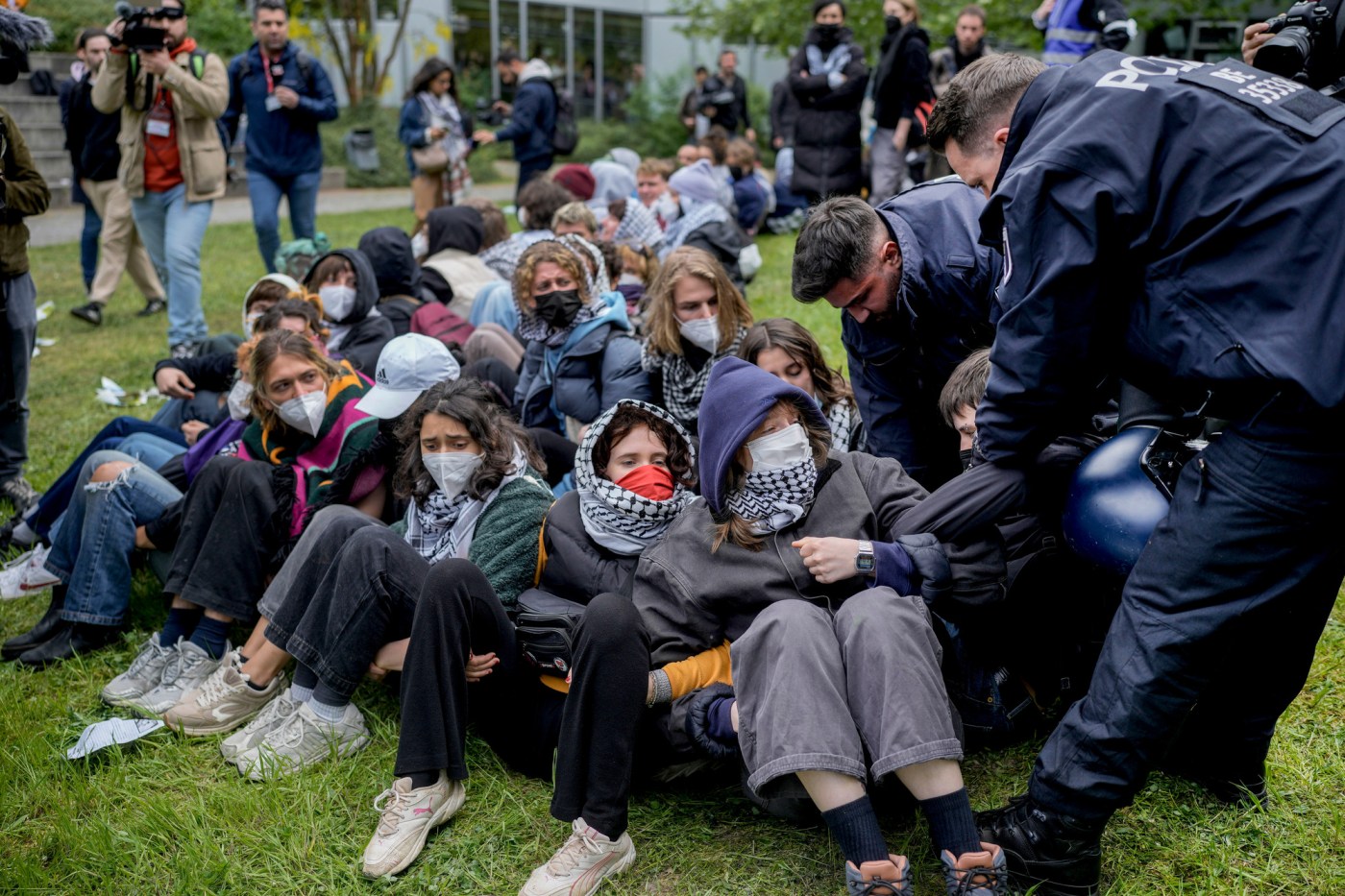By Mike Corder, Barbara Surk and Pietro de Cristofaro | Associated Press
AMSTERDAM — German police on Tuesday broke up a protest by several hundred pro-Palestinian activists who had occupied a courtyard at Berlin’s Free University earlier in the day, the latest such action by authorities as protests that have roiled campuses in the United States spread across Europe.
Some demonstrators have even called for a break in academic ties with Israel over the war in Gaza.
In Berlin, the protesters had put up about 20 tents and formed a human chain around them. Most had covered their faces with medical masks and draped keffiyeh scarves around their heads, shouting slogans such as “Viva, viva Palestina.”
Berlin police called on the students via loudspeakers to leave the campus. Police were seen carrying some students away as scuffles erupted between officers and protesters. Police also used pepper spray against some of the protesters. The school’s administrators said in a statement that the protesters had rejected any kind of dialogue and they had therefore called in police to clear the campus.
“An occupation is not acceptable on the FU Berlin campus,” university president Guenter Ziegler said. FU is the abbreviation for Free University. “We are available for academic dialogue — but not in this way.”
The administrators said some protesters attempted to enter rooms and lecture halls at Free University in order to occupy them. The protest organizers had called on other students and professors to take part in the action, the university statement said.
The organizers said the protests were made up of students from various Berlin universities and other individuals.
Berlin Mayor Kai Wegner hailed the school’s decision to call in police before things escalated.
In recent days, students have held protests or set up encampments in Finland, Denmark, Italy, Spain, France and Britain, mirroring protests at U.S. campuses.
In the eastern German city of Leipzig, about 50 pro-Palestinian protesters set up tents on campus of the Leipzig University and occupied a lecture hall on Tuesday afternoon, dpa reported.
The news agency said that the main student association in the state of Saxony, where Leipzig is located, the KSS, called on the university to break up the occupation. The association’s spokesperson, Paul Steinbrecher, told dpa that the group behind it had attracted attention with antisemitic statements and that the safety of Jewish and Israeli students was threatened.
Earlier on Tuesday, Dutch police broke up a similar pro-Palestinian demonstration camp at the University of Amsterdam. Police spokeswoman Sara Tillart said about 140 protesters were arrested, two of whom remain in custody on suspicion of committing public violence.
Amsterdam police said on the social media platform X that their action was “necessary to restore order” after protests turned violent. There were no immediate reports of injuries.
Video aired by national broadcaster NOS shows police using a mechanical digger to push down barricades and officers with batons and shields moving in, beating some of the protesters and pulling down tents. Protesters had formed barricades from wooden pallets and bicycles, NOS reported.
The Amsterdam University said in a statement that police ended the demonstration at its Roeterseiland campus “due to public order and safety concerns.”
“The war between Israel and Hamas is having a major impact on individual students and staff,” it said. “We share the anger and bewilderment over the war, and we understand that there are protests over it. We stress that within the university, dialogue about it is the only answer.”
A crowd that swelled to some 3,000 demonstrators, including students and academic staff, some wearing keffiyeh scarves, gathered Tuesday afternoon near the location of the dismantled camp, chanting slogans including, “Palestine will be free!” and “Cops off campus!”
Amsterdam police said that riot officers were deployed to close off a road and used their shields against one protester who climbed onto a police vehicle. A smaller group of protesters also gathered outside another of the university’s buildings in the historic heart of Amsterdam, local media reported.
Jamil Fiorino-Habib, a lecturer at the university’s media studies department, told the gathering, “the only path forward is a total academic boycott of Israel.”
In Austria, protesters camped out in about 20 tents set up in the main courtyard of the University of Vienna for a second day Tuesday. With police monitoring, protesters cordoned off the encampment, which is near a memorial for Austrian Jews who perished in the Holocaust.
The University of Vienna and the main Austrian Union of Students distanced themselves from the protest. The union said “antisemitic groups were among the protest’s organizers,” which the protesters denied.
Pro-Palestine protest camps have sprung up at about a dozen universities in Britain, including at Oxford and Cambridge, urging the institutions to fully disclose investments, cut academic ties with Israel and divest from businesses linked to the country.
Dozens of students have pitched up Gaza solidarity encampments on lawns outside King’s College at Cambridge University and the Pitt Rivers Museum in Oxford.
“Oxbridge’s profits cannot continue to climb at the expense of Palestinian lives, and their reputations must no longer be built on the whitewashing of Israeli crimes,” said a joint statement from protesters at the two universities.
Over 200 Oxford academics have signed an open letter supporting the protests.
In Finland, dozens of protesters from the Students for Palestine solidarity group set up an encampment outside the main building at the University of Helsinki, saying they would stay there until the university, which is Finland’s largest academic institution, cuts academic ties with Israeli universities.
In Denmark, students set up a pro-Palestinian encampment at the University of Copenhagen, erecting about 45 tents outside the campus of the Faculty of Social Sciences. The university said students can protest but called on them to respect the rules on campus grounds.
“Seek dialogue, not conflict and make room for perspectives other than your own,” the administrators said on X. The administration “cannot and must not express an opinion on behalf of university employees and students about political matters, including about the ongoing conflict” in Israel and the Palestinian territories, the statement said.
On their Facebook page, members of the activist group Students Against the Occupation said their attempts to talk to the administration over the past two years about withdrawing the school’s investments from companies with ties to activities in Israeli settlements in the occupied Palestinian territories have been in vain.
“We can no longer be satisfied with cautious dialogue that does not lead to concrete action,” the group said.
In Italy, students at the University of Bologna, one of the world’s oldest universities, set up a tent encampment over the weekend to demand an end to the war in Gaza as Israel prepared an offensive in Rafah, despite pleas from its Western allies against it. Groups of students organized similar protests in Rome and Naples, which were largely peaceful.
More than a dozen tents were set up in a piazza named for a university student who fought against fascist rule during World War II. Some were decorated with Palestinian flags and a banner read “Student Intefadeh,” or “Student Uprising.”
In Spain, dozens of students have spent over a week at a pro-Palestinian encampment on the University of Valencia campus. Similar camps were set up Monday at the University of Barcelona and at the University of the Basque Country. A group representing students at Madrid’s public universities announced it would step up protests against the war in the coming days.
In Paris, student groups called for gatherings in solidarity with Palestinians later Tuesday.
On Friday, French police peacefully removed dozens of students from a building at the Paris Institute of Political Studies, known as Sciences Po, after they had gathered in support of Palestinians.
On Tuesday, students at the prestigious institution, which counts French Prime Minister Gabriel Attal and President Emmanuel Macron among its alumni, were seen entering the campus unobstructed to take exams as police stood at the entrances.
Protests took place last week at some other universities in France, including in Lille and Lyon. Macron’s office said police had been requested to remove students from 23 sites on French campuses.
Surk reported from Nice, France, and De Cristofaro from Berlin. Associated Press reporters Aleksandar Furtula in Amsterdam, Stephanie Liechtenstein and Philipp-Moritz Jenne in Vienna; Sylvia Hui in London; Kirsten Grieshaber in Berlin; Nicole Winfield in Rome; Joe Wilson in Barcelona, Spain; Jan M. Olsen in Copenhagen, Denmark, and Jari Tanner in Helsinki, Finland, contributed to this report.












